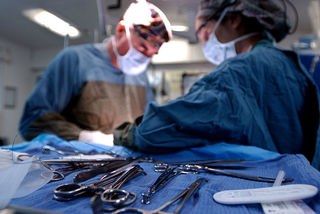Eating Disorders
Is Weight Loss Surgery a Good Treatment for Binge Eating?
New research indicates poorer outcomes for patients with BED
Posted December 16, 2016

For many who struggle with binge-eating disorder (BED), weight loss seems like the cure to the body image dissatisfaction that is a hallmark of the disorder. It is estimated that between 16-27% of people seeking weight loss surgery have BED. The disorder is not currently seen as a contraindication for weight loss surgery and people diagnosed with BED routinely undergo bariatric surgery.
A study by Chao et al (2016) published in the journal Obesity investigated the outcomes of people with BED who underwent bariatric surgery (either the Roux-en-Y gastric bypass or the laparoscopic adjustable gastric banding procedure). The researchers recruited 3 groups of participants for the study: bariatric surgery candidates with BED (n=33 participants), bariatric surgery candidates without BED (n=59), and a control group of participants with BED who met BMI criteria for obesity and who sought weight loss through lifestyle modification (n=49). Participants in the lifestyle modification program met for group sessions led by a psychologist, followed a calorie-restricted diet, and were encouraged to increase their aerobic activity. All participants in the study were at least 18 years old and met body mass index (BMI) criteria for bariatric surgery: BMI>40 or BMI>35 with a co-morbid medical condition. BED was assessed using the Eating Disorder Examination (EDE) and both objective binge-eating episodes (OBE) (characterized by eating a large amount of food with loss of control) and subjective binge-eating episodes (SBE) (characterized by loss of control in the absence of consuming a large amount of food) were measured. Participants’ weights were also tracked.
Results of this study indicate that 24-months following surgery, participants who were diagnosed with BED prior to surgery lost significantly less weight (mean=18.6% of baseline weight) than participants without BED who underwent surgery (mean=23.9%). Participants with BED who underwent surgery did lose more weight than participants with BED who participated in the lifestyle modification program (mean=5.6%). An earlier study published by these authors revealed no significant differences in weight loss between the two surgery groups 12-months following surgery. This suggests that participants with pre-operative BED may initially lose a comparable amount of weight as their non-BED peers but then tend to regain significantly more weight 12-24 months after surgery.
Many participants dropped out of this study prior to completing the 2-year follow-up assessments about eating behaviors; only 63% of the original sample completed the EDE at 24-months (surgery BED group n=24 participants, surgery non-BED group n=36, lifestyle modification group n=29). The study authors note that this attrition is problematic because those participants who did not return for the follow-up visit could have had poorer outcomes than those who stayed engaged in the study.
Among the participants in the surgery BED group who completed the follow-up assessments, 3 (12.5%) still met criteria for BED, 3 (12.5%) reported an OBE, and an additional 11 (45.8%) experienced a SBE in the prior month. This was statistically similar to the participants with BED who underwent the lifestyle modification program: 4 participants met criteria for BED (14.8%), 6 participants reported OBE (20.7%) and 13 (44.8%) reported SBE.
The researchers did not assess for other types of eating disordered behaviors that may emerge following bariatric surgery such as restrictive eating, purge disorders, grazing, chewing and spitting, or compulsive exercise. Nor did they assess for body image, which often remains problematic following weight loss surgery. The authors conclude that, while participants with BED who underwent bariatric surgery lost significantly less weight than participants without BED, BED should not be considered a contraindication to surgery since weight loss outcomes were still generally favorable. However, I believe that further research needs to be done into the course of disordered eating and body image following bariatric surgery for patients with BED before we can consider this a safe or effective treatment for BED. What do you think?
Dr. Alexis Conason is a clinical psychologist in private practice in New York City specializing in body image and overeating disorders. To learn more about Dr. Conason's practice and mindful eating, please visit www.drconason.com, like her on Facebook, and follow her on Twitter.
References
Reference: Chao AM, Wadden TA, Faulconbridge LF, Sarwer DB, Webb VL, Shaw JA…Williams NN. (2016). Binge-Eating Disorder and the Outcome of Bariatric Surgery in a Prospective, Observational Study: Two-Year Results. Obesity, Advance Online Publication.


